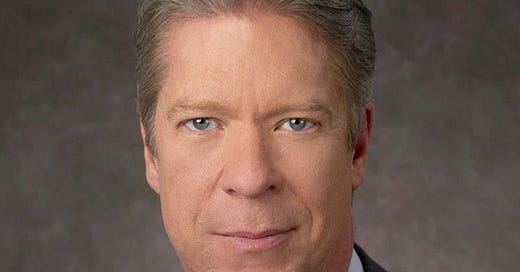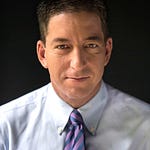Hello! Welcome to another edition of Inside The Newsroom where today’s guest is… Major Garrett, Chief White House Correspondent for CBS News and one of the hardest working journalists in the world today. Major and I discussed everything from how nerve-wracking it is to ask questions in front of the world in the WH press briefing room, to his spats with Barack Obama to being in the Oval Office with Donald Trump. It truly was a fascinating conversation and below is a post-game of everything we talked about. But first, my picks of the week followed by some personal news… Enjoy! 🤓
Picks of the Week
Joe Biden — Pressure is building on the Democratic nominee, who so far has remained silent pertaining to an alleged sexual assault from 1993
Louis Theroux — The greatest documentarian to have ever lived has a podcast! His first guest is Jon Ronson
Tiger King — I finally caught up to the hoopla and my god this show is fucked up. But also my god everyone must watch it
Personal News
Today is my last day working on the visuals desk at The Guardian. It’s been an incredible two years at the UK’s foremost news source and a dream come true working for my “hometown” paper I grew up reading. So it was incredibly tough to leave but I’m thrilled and blessed to be joining The Wall Street Journal on Monday. Here’s to the next chapter!
Like Me, Please
Before you read on, please like this edition of Inside The Newsroom by clicking the ❤️ up top. That way I’ll appear in clever algorithms and more people will be able to read. Cheers.
Major 👇

Who is Major Garrett?
Major graduated from Mizzou in 1984 with degrees in journalism and political science. He’s been CBS News’ Chief White House Correspondent since 2012, and before that made stops with multiple outlets including the Amarillo Globe-News, the Las Vegas Review-Journal, the Houston Post, The Washington Times, U.S. News and World Report, CNN, the National Journal and Fox News, making him truly one of the most non-partisan reporters in America. And putting him over the top giving him rockstar status, Major also appeared on the Late Show with the legendary Stephen Colbert…
As you’ll discover from the podcast, there may not be a harder working political reporter today. Major is also the author of four books — Common Cents, The Enduring Revolution, The Fifteen Biggest Lies in Politics, and Mr. Trump’s Wild Ride — and host of two podcasts for CBS — The Takeout and Debriefing the Briefing. Many of you may know Major from his courage to ask presidents the toughest questions, and there’s no better place to start than with Barack Obama…
Major vs Obama
Major’s highest profile moment came in July 2015, when he asked then President Obama a tough question that rattled even the usually unshakable Obama. After signing off on a nuclear deal with Iran that reduced the amount of uranium — used to fuel nuclear weapons — stockpiled by Iran, Obama faced an hour of questions by reporters on the specifics of the deal and the decisions he made to get the deal over the line. One of those questions came from Major, who challenged the President on why he didn’t include the release of four American hostages held by the Iranians as a condition for the deal. Below is the encounter and Major’s take on the confrontation.
But that wasn’t Major’s first run-in with Obama. In June 2009, Iran was once again the topic of contention, this time as it pertained to Obama placing his administration on the side of the grassroots protestors against the Iranian regime. Then working for Fox News, Major explained in the podcast that reporters from the wire services — the AP, Bloomberg, Reuters etc — are routinely the first to be called upon by the President, but on this day, Obama picked Major to ask the first question. Major had to begin the press conference by asking about the most important issue, so after reading back several of Obama’s statements, Major simply asked “What took you so long?”, referring to growing pressure over previous weeks for Obama to pick a side. Let’s just say Obama wasn’t too happy.
Everything’s Different With President Trump
Presidents and the media have had feuds since politics began in America, but I’m not breaking news by asserting that reporting in the age of Trump is different to anything journalists have experienced before. Major has covered the administrations of Bill Clinton, George W. Bush, Obama and Trump, and emphatically said he’s never covered a president so combative as Trump, and that includes his two run-ins with Obama. In normal circumstances, political reporters from different networks rarely offer feedback to their peers, often keeping to themselves and concentrating on the task ahead. But the Trump administration has altered that, and we may never have seen a White House press corps proverbially stand so close together with reporters from rival outlets often supporting one another in the briefing room amid the barrage of attacks from the man at the front.
What’s the Point of Political Debates?
Major has moderated three major political debates in his career, most recently the Democratic South Carolina debate in February. The amount of dedication and preparation that goes into each debate is admirable, often taking weeks to research and practice every question and every scenario. If you’re like me, you’ll devour every single minute of every single one of the billion political debates the RNC and DNC hold every presidential cycle, especially if it involves Republicans screwing up walking to the stage when their names are called. God damn it gets me every time.
But once the dopamine has run out, you’ll question the actual motive of having so many damn debates. Between June 2019 and March 2020, the DNC held an insane 13 debates, with at least 10 candidates on the stage at one time in the first seven. Apart from boosting ratings and the millions of dollars generated in fundraising, the debates do actually have a practical purpose. Just ask Michael Bloomberg.
After weeks of sinking hundreds of millions of dollars in TV ads, Bloomberg took to the stage for the first time in Nevada. At the time, Bloomberg’s poll numbers were surging to 16 percent and he looked like a legitimate contender, but that ended exactly 14 days later thanks to Queen Elizabeth Warren, who rolled Bloomberg’s racist and sexist temperament into a ball and flicked him away like a bogey. If you look close enough, you can actually see Mini Mike’s soul leave his body.
Laughs and takedowns aside, do political debates actually make a difference to voting habits? How on earth is 30 or 60 seconds, often with grown adults shouting over one another, enough time to discuss solutions to real issues? In my opinion it’s not, and the scientific evidence largely agrees that noticeable changes in polling and voting after debates are hard to identify.
This Week …
#73 — Nick Rubando (U.S. House Candidate) on running for the office for the first time and why Midwestern politics is so weird
… Last Week …
#72 — Ryan Broderick (BuzzFeed) on the 15th anniversary of YouTube
#71 — Andrea Jones-Rooy (Comedian, Social Scientist) shooting the shit on coronavirus, journalism and other funny things
… Next Week
Betsy Sweet (U.S. Senate Candidate) from Maine
Job Corner
Sign up to the Inside The Newsroom Job Board for weekly updates to more than 500 journalism jobs, internships and freelance gigs in the U.S., UK and around the world.
Thanks for making it all the way to the bottom. Please like and share this edition of Inside The Newsroom by clicking the ❤️ below. That way I’ll appear in clever algorithms and more people will be able to read.
If you haven’t already, please consider subscribing to get a newsletter about a cool news topic in your inbox every time I publish. You can find me on Twitter at @DanielLevitt32 and email me corrections/feedback or even a guest you’d like me to get on the podcast at daniellevitt32@gmail.com.














Share this post